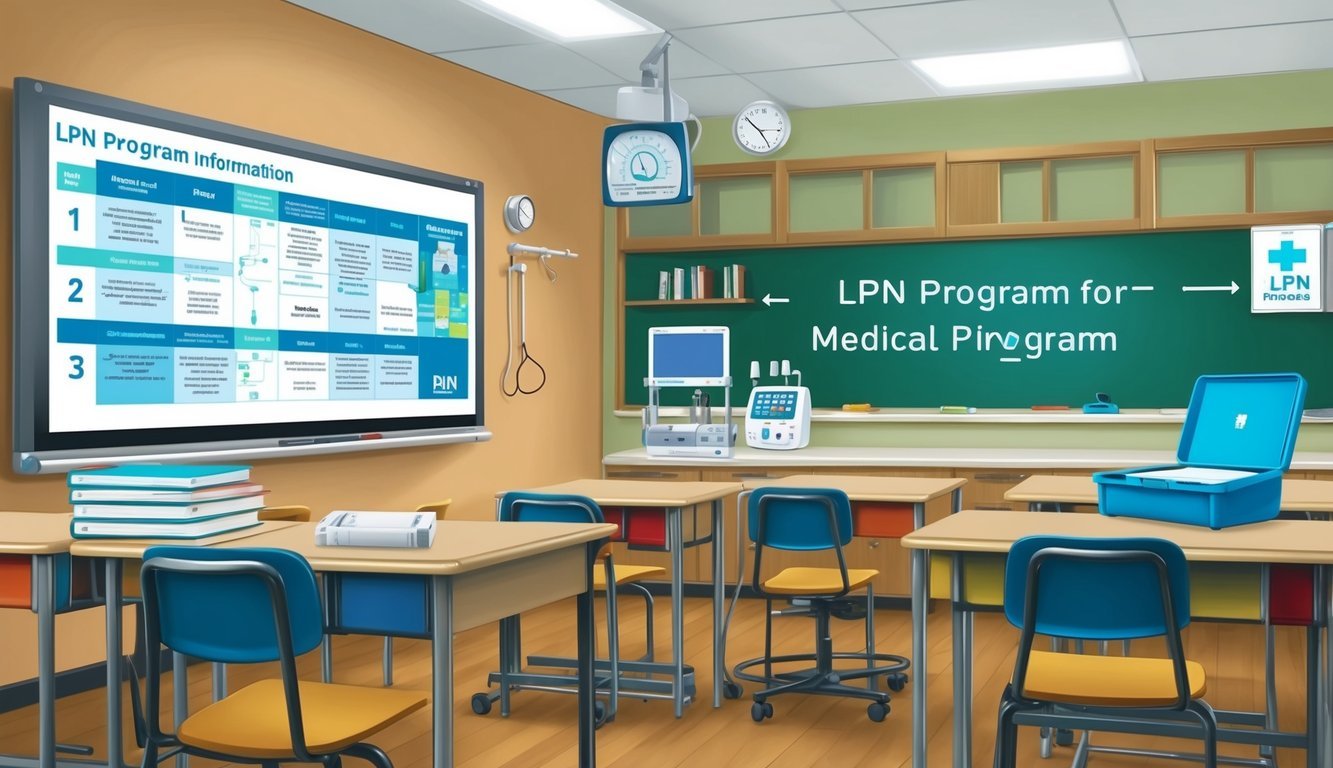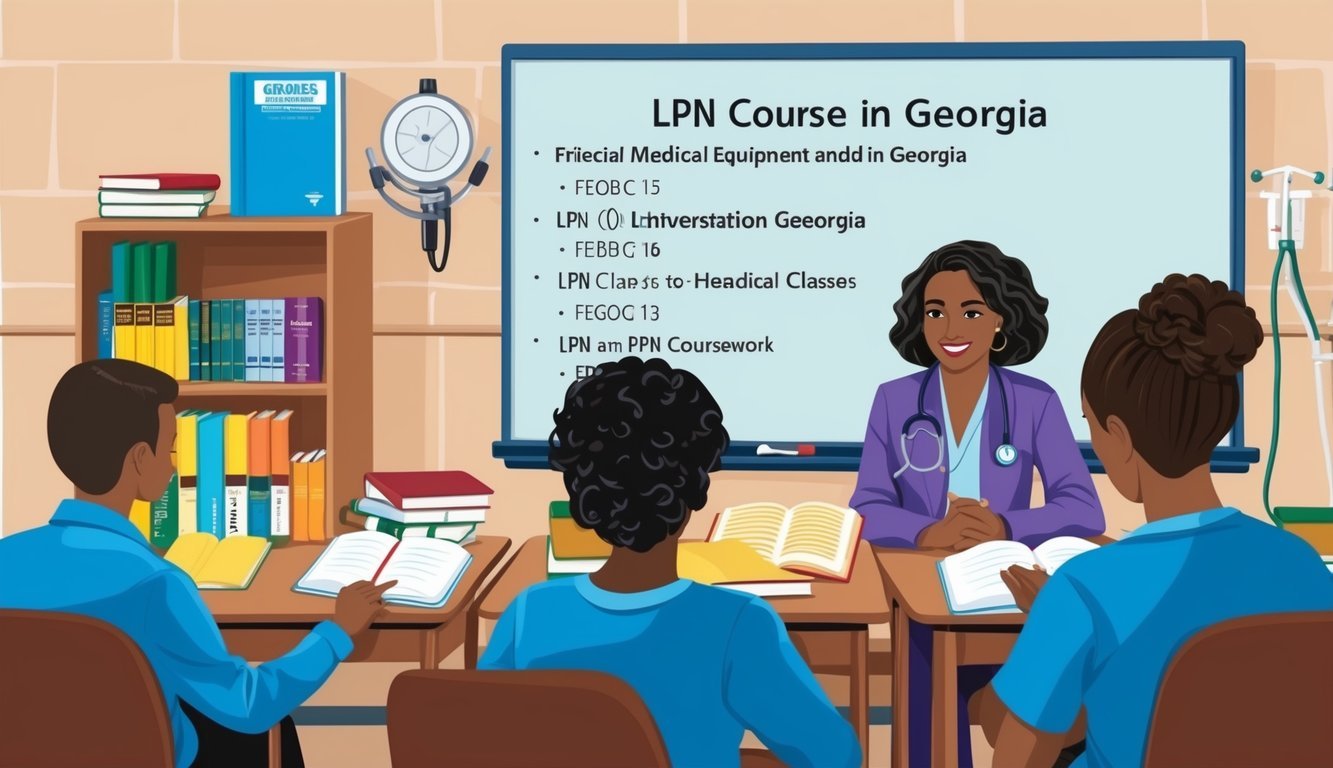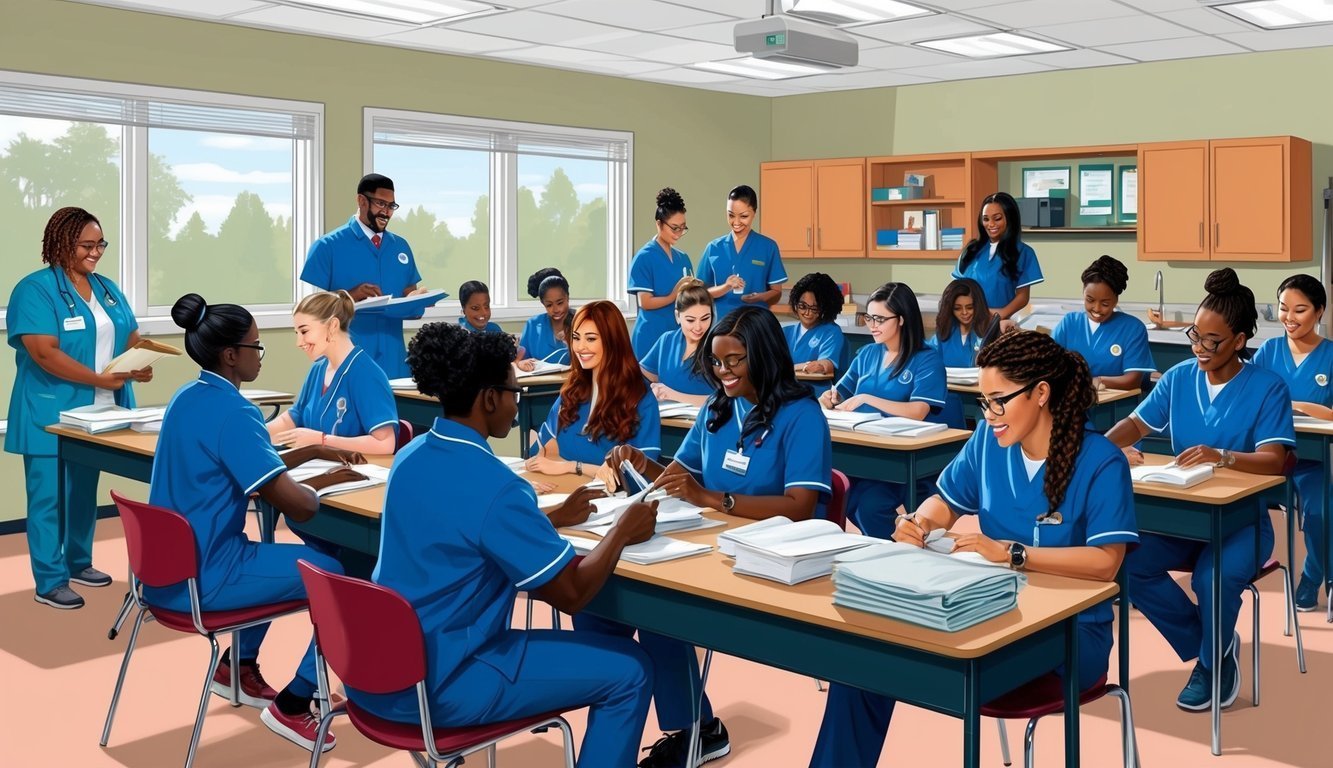If you’re considering a career in nursing, the 6-month LPN program in Georgia offers an accelerated path to becoming a Licensed Practical Nurse.
These programs are designed for those who want to enter the workforce quickly while receiving quality training.
In just half a year, you can gain the skills and knowledge needed to provide essential patient care.
Many Georgia schools offer these practical nursing programs, combining classroom instruction with hands-on clinical experience.
The curriculum covers vital topics such as anatomy, nursing fundamentals, and patient care techniques.
With clinical rotations, you’ll gain real-world experience that prepares you for the demands of the job in various healthcare settings.
Completing a 6-month LPN program can fast-track your journey to a fulfilling nursing career.
As you explore your options, understanding admission requirements and the licensure process can help you make informed decisions about your future in nursing.
Key Takeaways
- The 6-month LPN program prepares you quickly for a nursing career.
- Admission requirements typically include a high school diploma and background checks.
- Clinical experience is essential for applying what you learn in the classroom.
Overview of 6-Month LPN Programs

6-month LPN programs provide a focused and accelerated path for individuals seeking practical nursing careers.
These programs emphasize essential nursing skills and clinical experiences, allowing you to enter the workforce quickly.
Here are the key aspects of these programs.
Fast Track Practical Nursing
Fast track practical nursing programs are designed for those who want to complete their education in a short time frame.
Typically lasting 6-9 months, these programs combine classroom learning with hands-on practice in clinical settings.
Many programs, like those offered in Georgia, may include:
- Coursework: Focus on fundamental nursing topics, such as anatomy, pharmacology, and patient care.
- Clinical Practice: You will gain real-world experience in hospitals, clinics, or nursing homes.
- Flexible Formats: Options may include online and campus-based classes to fit various schedules.
These programs can lead to a Practical Nursing Diploma or Certificate, which prepares you to take the NCLEX-PN exam required to become a licensed practical nurse.
Credentials Offered
Upon completing a 6-month LPN program, you will receive specific credentials that enhance your employability.
Most commonly, you will earn:
- Practical Nursing Diploma or Certificate: Indicates you have completed an accredited nursing program.
- Eligibility for NCLEX-PN: Allows you to sit for the licensing exam to become a licensed practical nurse.
Programs in Georgia are often accredited by organizations like the Accreditation Commission for Education in Nursing (ACEN), ensuring that your education meets high standards.
This accreditation also helps when seeking employment and further education opportunities.
You can find a variety of LPN programs available in Georgia that focus on these essential credentials and fast-track options.
Admission Requirements and Process

The admission process for a 6-month LPN program in Georgia includes specific educational prerequisites and health and safety requirements.
Meeting these criteria is essential for your application to be considered.
Educational Prerequisites
Before applying, you must have a minimum of a High School Diploma or a GED.
This serves as the foundational requirement for most LPN programs.
You will typically need to provide documentation to verify your educational background.
Some programs may have additional course prerequisites, like English, math, or science courses, that you must complete with a passing grade.
If your GPA meets a certain threshold, it may enhance your application.
Be sure to check with your chosen program for any specific educational requirements or admitting conditions.
Health and Safety Requirements
In addition to educational qualifications, you must fulfill certain health and safety requirements.
A Criminal Background Check is mandatory to ensure the safety of patients you will serve in your nursing career.
Additionally, a Drug Screen is often required.
This confirms that you are fit for duty and comply with health regulations.
Some programs may also require a Fingerprint Clearance Card.
This card verifies your identity and is often needed for clinical placements.
Make sure to check these requirements directly with your program, as they may vary.
Curriculum and Coursework

The curriculum for a 6-month LPN program in Georgia is designed to provide essential nursing education.
It covers a range of topics, focusing on practical nursing skills and foundational knowledge in the healthcare field.
You will engage in various courses that prepare you for clinical practice.
Nursing Fundamentals
In this section, you will study the basic principles of nursing education.
Key topics include nursing theory, health science, and fundamental skills that every practical nurse must master.
Core courses may include:
- Introduction to Nursing
- Anatomy and Physiology
- Pharmacology
You will learn how to provide safe, effective care to patients in different environments.
Skills training in simulated labs will help you practice techniques like taking vital signs and administering medications.
This foundational knowledge is essential for your future in medical-surgical nursing, where you will help manage patients with varying health conditions.
Specialized Nursing Fields
Once you grasp the fundamentals, the program introduces specialized nursing fields.
This may include maternity nursing and other focused areas.
Important specialized areas might include:
- Maternity Nursing
- Pediatric Nursing
- Geriatric Nursing
Courses in specialized fields prepare you to work with distinct patient groups.
You will learn about the unique challenges and considerations in each area.
By studying these specialized fields, you enhance your ability to provide comprehensive care tailored to different populations.
This knowledge is critical for your successful entry into the workforce.
Clinical Experience

Clinical experience is essential for you as a student in a 6-month LPN program.
This hands-on training allows you to apply classroom knowledge in real-world settings.
You’ll gain skills in various environments like hospitals and long-term care facilities.
Hospitals and Medical Centers
In hospitals and medical centers, you will experience acute care.
Here, you provide direct nursing care under the supervision of a clinical instructor.
Your tasks may include:
- Monitoring patient vitals
- Administering medications
- Assisting with daily activities
This setting exposes you to different medical conditions and treatments.
You will observe healthcare professionals working in teams, which is crucial for your nursing education.
You will also develop critical thinking skills as you respond to patients’ needs in real-time.
Long-Term Care and Rehabilitation
Long-term care facilities, including nursing homes, focus on patients needing ongoing support.
In these environments, you will work closely with residents who have chronic illnesses or disabilities.
Key responsibilities will include:
- Assisting with personal hygiene
- Supporting mobility and rehabilitation
- Communicating with family members
Understanding the complexities of long-term care helps you develop compassion and patience.
You’ll learn about the unique needs of elderly patients and how to create supportive environments for their well-being.
These experiences are vital for becoming a competent Licensed Practical Nurse.
Licensure and Examination

After completing your LPN program, you must pass the NCLEX-PN exam to become licensed.
Understanding the requirements set by the Georgia Board of Nursing is essential.
This section outlines how to prepare for the exam and the specific requirements for licensure in Georgia.
Preparing for the NCLEX-PN Exam
To prepare effectively for the NCLEX-PN exam, consider the following strategies:
- Study Materials: Use NCLEX-PN review books, online courses, and practice exams.
- Study Groups: Join a study group with fellow students to enhance learning.
- Practice Questions: Regularly answer practice questions to familiarize yourself with the exam format.
Make sure to schedule your exam as soon as you are eligible.
The National Council Licensure Examination includes various types of questions, such as multiple-choice and weighted items.
Aim to understand both content and test-taking strategies.
Georgia Board of Nursing Requirements
To become a Licensed Practical Nurse in Georgia, you must meet specific requirements:
- Graduation: Complete a Board-approved practical nursing program.
- Application: Submit your application to the Georgia Board of Nursing, including all required documents.
- Examination: Pass the NCLEX-PN. Once you do this, you can apply for your LPN license.
Your application to the board must be accompanied by the required fees.
Keep track of renewal dates as the license must be renewed every two years.
For more detailed guidelines, check the Georgia Board of Nursing website.
Frequently Asked Questions
When considering a career as a Licensed Practical Nurse (LPN) in Georgia, you may have specific questions.
This section provides clear answers to common inquiries about eligibility, program duration, costs, online options, and financial aid.
What are the eligibility criteria for enrolling in an LPN program in Georgia?
To enroll in an LPN program in Georgia, you generally need a high school diploma or GED.
Additionally, most schools require you to pass an entrance exam, which may include math and reading assessments.
Some programs may also ask for immunization records and a background check.
What is the duration of accredited LPN programs in Georgia?
Accredited LPN programs in Georgia typically last about 12 months.
The programs may offer different schedules, such as daytime, evening, or weekend classes.
This flexibility can help you balance studies with other commitments.
Are there any LPN programs in Georgia that offer an accelerated path to completion?
Yes, some institutions in Georgia offer accelerated LPN programs.
These programs are designed for students who can dedicate more time to their studies.
They may complete the program in as little as six months, allowing for quicker entry into the nursing workforce.
How much does it typically cost to complete an LPN program in Georgia?
The cost of completing an LPN program in Georgia usually ranges from $10,000 to $20,000.
This amount can depend on the institution and additional fees, such as textbooks and supplies.
Some programs provide detailed budgets to help you plan.
Can LPN training be completed online in Georgia, and if so, which schools offer this option?
Yes, some LPN training can be completed online in Georgia.
Online programs often combine virtual coursework with in-person clinical experiences.
Schools like Chattahoochee Technical College provide hybrid options that allow for flexibility.
Do any institutions in Georgia offer financial aid or free LPN programs?
Many institutions in Georgia offer financial aid options for LPN students.
You can explore scholarships, grants, and student loans through programs like the Georgia HOPE Scholarship.
Some community colleges also provide assistance or lower-cost programs based on academic performance or financial need.

